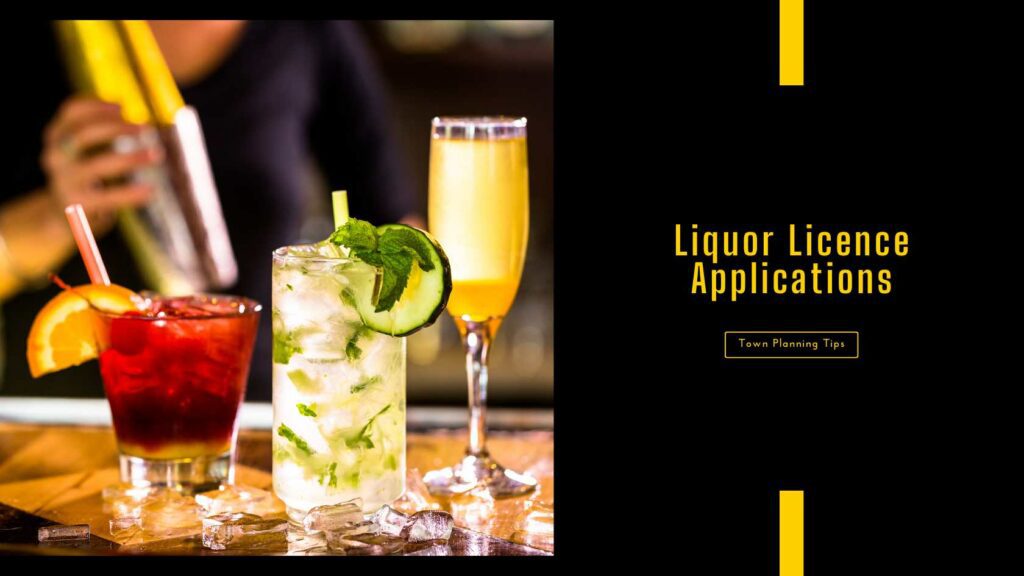25 Oct Liquor Licence Applications

Did you know that before you can get a liquor licence for your new bar or restaurant, first you will need a planning permit? This includes if you want to extend the hours or patrons on an existing liquor licence as well.
Many Councils have local policies that seek to encourage or limit liquor licences or live music activities in certain areas. Noise, car parking, cumulative impact of licensed venues and amenity impacts are some of the important things that the Council will consider as part of the planning application.
NOISE
Noise emissions don’t just relate to residential amenity, but this is often a primary consideration of the acoustic impact associated with a liquor licence. For new or expanding liquor licensed venues near residential uses, the Council will likely require an Acoustic Report. It depends on the location of the site and the nature of the proposal, but with residential uses being encouraged in Activity Centres, acoustic assessments are becoming more common. Depending on the findings of the Acoustic Report, the total patrons or hours of operation that you can trade with could be impacted, especially for outdoor areas. It is advisable to discuss a project with an Acoustic Engineer early in the process to identify any potential issues and ways they could be mitigated, particularly if you are wanting to trade in outdoor areas in the evenings or operate after 10pm (after 10pm is the most noise sensitive time period).
CAR PARKING
A new or expanding use may trigger car parking consideration. Not all applications for a liquor licence or changes to trading allowances will require car parking to be provided, but what does and does not trigger car parking can be complex so it is best to get upfront advice.
Depending on the nature of the proposal and any car parking reduction that needs to be sought, there may be additional requirements such as a Car Parking Assessment of the area. You can read more about car parking assessments here.
Council may also consider the journey accessibility of the venue as well. Encouraging and supporting alternatives to driving to licensed venues can be a consideration, particularly with heightened awareness of drink driving campaigns. A large venue in a location that has poor public transport accessiblity is likely to be a major concern so considering the location early is very important.
CUMULATIVE IMPACT
The Council will consider any potential impacts to the clustering or accumulation of licensed venues. Clustering of venues can be both positive and negative, however, depending on the number and type of venues in an area, it may be considered that an additional or expanded liquor licence will cause amenity impacts in the area. An application for a liquor licence should include details of licensed venues within 500m in order to detail what clustering may be occuring and consideration of any impacts if there is a significant concentration of existing venues.
AMENITY IMPACTS
While not the only potential amenity impacts that could be considered, residential amenity will be a major consideration in locations close to existing residential uses. As well as the impacts associated with the other items already discussed (noise, car parking and clustering of licensed venues), there is also consideration of the ongoing management and running of the venue. Particularly for bars, live music venues and nightclubs there will be consideration of the safety and security of both patrons and nearby properties. Consideration of things such as the need for security staff, cameras or lighting and venue management plans to detail how complaints and staff training will be maintained are common requirements.
Of course, not all of these things will be required for all applications. A small neighbourhood restaurant that is looking to go from BYO to a restaurant liquor licence to 10pm will have much less impact than a large late night live music venue. The information requirements and potential amenity conditions will be significantly less for the low scale restaurant example over the live music venue for obvious reasons.
If you are considering seeking out a planning permit for a liquor licence or looking to expand an existing venue, contact us to discuss your project. We have experience with both small family restaurants as well as larger venues and can advise on potential concerns and likely information requirements to get you started on your planning journey today!

